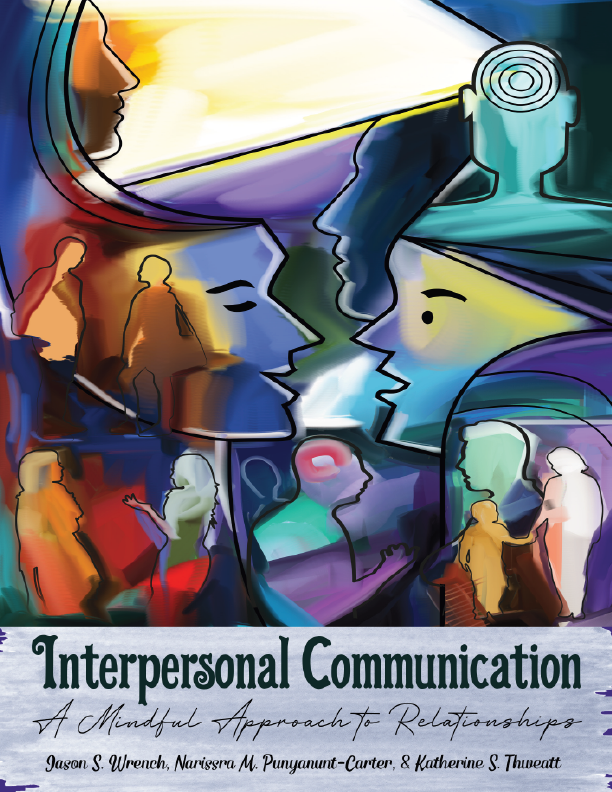The term “interpersonal communication” refers to messages sent and received between two people. Most of our daily lives involve interpersonal communication on some level. When many people hear the word “interpersonal,” they immediately think of intimate relationships, but this is only one small fraction of the types of interpersonal interactions we have daily. Whether we are communicating with our spouse or dating partner, communicating with a coworker, communicating with a physician or therapist, or communicating with a random stranger, you are engaging in interpersonal communication. Interpersonal communication is the way people connect with other people.
William Schutz proposed three main reasons for why interpersonal communication is important to human beings in his Fundamental Interpersonal Relations Orientations Theory: control, inclusion, and affection. The first need met through interpersonal relationships is our need to influence other people. People have an inherent need to control situations and the people within those situations.
Whether we are talking about using persuasion attempts to get someone to go out with us on a date or using leadership skills to control what happens in the boardroom, control is a fundamental need for our interpersonal relationships. Most people don’t like thinking about interpersonal relationships as an issue of “control” because that doesn’t necessarily sound nice. It’s essential that we clearly distinguish control from manipulation. Control refers to an individual’s ability to influence another person’s behavior or ideas.
When we talk about control, we are talking about influencing another person’s behavior or ideas because it is perceived as the right thing to do. Manipulation, on the other hand, is influencing another person’s behavior or ideas to one’s own advantage, often using dishonest, unscrupulous, and insidious means. Image by Engin Akyurt from Pixabay xix Interpersonal Communication Control, in, and of itself, is neither good nor bad. The second need we fulfill through interpersonal relationships is inclusion. Everyone wants to belong. As humans, we have an innate desire to belong to groups and social communities. At the most basic level, we belong to our families when we are born. As we age, the desire to belong to other groups we deem as positive continues. In school, we may want to belong to sports teams or social groups like a fraternity or sorority. When we enter the workforce, we want to feel like we belong in the workplace or belong within our professions by being a member of professional associations. Our need to feel like we belong is a base need, and we fulfill this need through our daily interpersonal encounters.
The final need we fulfill through our interpersonal relationships is affection. The word “affection” stems from the Latin term affectio, which refers to emotions or feelings. Kory Floyd and Mark T. Morman defined “affection” as having an emotional state of fondness and positive regard toward a specific target.2 As you can see, our understanding of affection is still rooted in the notions of emotion and feeling today. We all want to feel someone else’s positive affection towards us, whether it’s from our parents, coworkers, friends, siblings, children, etc. We also have an innate need to feel affection towards others.
Hopefully, you can see that these three basic human needs—control, inclusion, and affection—are essential constructs to everyone’s daily life and interactions. Furthermore, these are central tenets to who we are as human beings. Much of our success in life is built upon these three needs, so exploring these needs and how people accomplish them effectively is very important. The interpersonal communication strategies we discuss in this book are tools. As with many tools, they can either be used to enhance people’s lives or destruct them. A kind word and smile may make someone’s day, but an evil glare and a cutting remark can just as quickly destroy someone’s day. For this reason, we want you to consider what it means to be an ethical communicator just as much as we want you to consider how you communicate and react to others’ communication with you. Realize that the way you communicate and interact with others will impact their lives as much as it affects yours.











